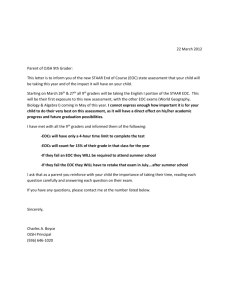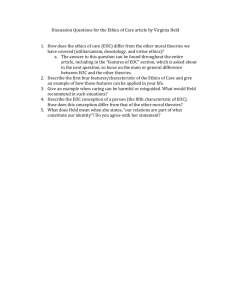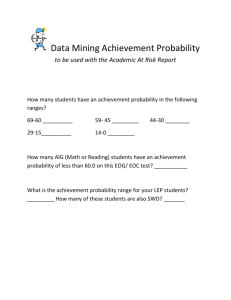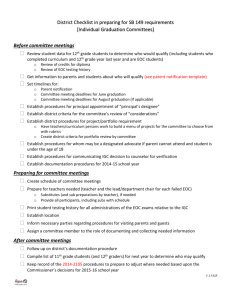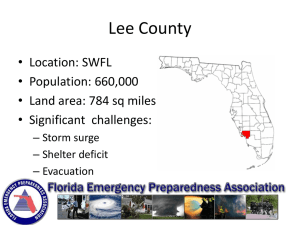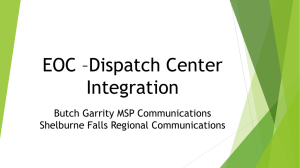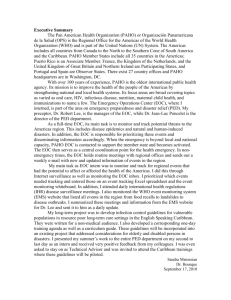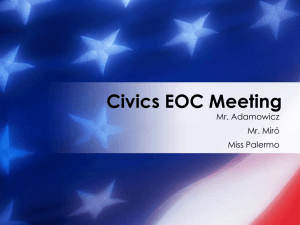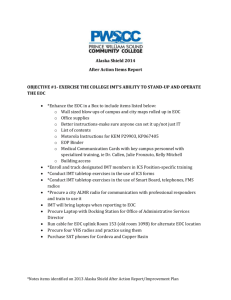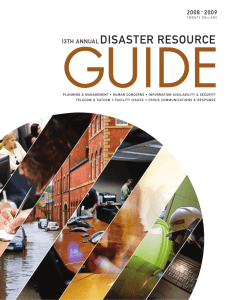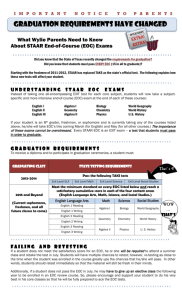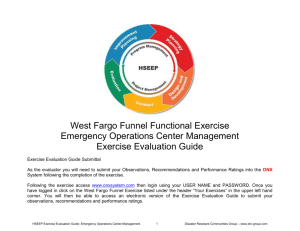COMX 520- - Seminar in Organizational Communication
advertisement
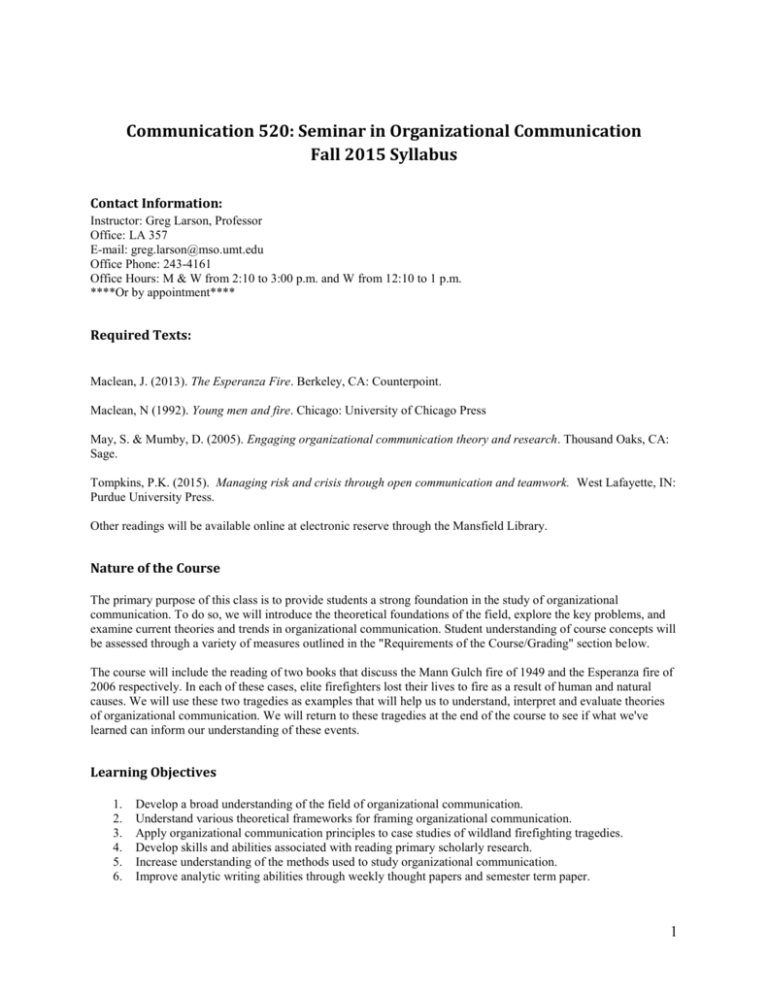
Communication 520: Seminar in Organizational Communication Fall 2015 Syllabus Contact Information: Instructor: Greg Larson, Professor Office: LA 357 E-mail: greg.larson@mso.umt.edu Office Phone: 243-4161 Office Hours: M & W from 2:10 to 3:00 p.m. and W from 12:10 to 1 p.m. ****Or by appointment**** Required Texts: Maclean, J. (2013). The Esperanza Fire. Berkeley, CA: Counterpoint. Maclean, N (1992). Young men and fire. Chicago: University of Chicago Press May, S. & Mumby, D. (2005). Engaging organizational communication theory and research. Thousand Oaks, CA: Sage. Tompkins, P.K. (2015). Managing risk and crisis through open communication and teamwork. West Lafayette, IN: Purdue University Press. Other readings will be available online at electronic reserve through the Mansfield Library. Nature of the Course The primary purpose of this class is to provide students a strong foundation in the study of organizational communication. To do so, we will introduce the theoretical foundations of the field, explore the key problems, and examine current theories and trends in organizational communication. Student understanding of course concepts will be assessed through a variety of measures outlined in the "Requirements of the Course/Grading" section below. The course will include the reading of two books that discuss the Mann Gulch fire of 1949 and the Esperanza fire of 2006 respectively. In each of these cases, elite firefighters lost their lives to fire as a result of human and natural causes. We will use these two tragedies as examples that will help us to understand, interpret and evaluate theories of organizational communication. We will return to these tragedies at the end of the course to see if what we've learned can inform our understanding of these events. Learning Objectives 1. 2. 3. 4. 5. 6. Develop a broad understanding of the field of organizational communication. Understand various theoretical frameworks for framing organizational communication. Apply organizational communication principles to case studies of wildland firefighting tragedies. Develop skills and abilities associated with reading primary scholarly research. Increase understanding of the methods used to study organizational communication. Improve analytic writing abilities through weekly thought papers and semester term paper. 1 Attendance/Punctuality/Participation The course, like most graduate courses, will be discussion intensive. It is therefore important that you come to class on time and prepared to discuss the assigned readings for the day. As much of the work in this class is reading, your attendance each class period to discuss and debate the readings is essential to the success of the course. You will receive a grade for your participation in daily class discussions. Cell phone use (including text messaging) is not allowed during class Special Assistance If some extenuating circumstances beyond your control prevent you from meeting your expectations for your attendance and performance, I expect you to contact me immediately. It is important that you contact me sooner rather than later. Notice to Students with Documented Disabilities Students with disabilities may request reasonable modifications by contacting me. The University of Montana assures equal access to instruction through collaboration between students with disabilities, instructors, and Disability Services for Students. “Reasonable” means the University permits no fundamental alterations of academic standards or retroactive modifications. See Disability Services for Students website. Due Dates A late written assignment will be penalized one full grade for each day it is late unless arrangements are made with me ahead of time. Presentations must be delivered on the day that they are due. Original Work Unless collaboration is part of the assignment, each assignment you turn in should be your own original work and should be done completely by you. You are expected to follow university policies as outlined in the Student Conduct Code and, as always, you are responsible for knowing what they are. Backup Copies You are responsible for keeping back-up copies of all work that you do for the class. Outside Research Outside research, beyond the assigned readings, is required for this course (no surprises there). 2 Requirements of the Course/Grading Assignment Points Available Participation Comparative Paper Weekly thought papers (8 total due) Term Paper Total Points 50 50 50 200 350 Letter grades are figured as follows (the +/- grading system will be used): A = Outstanding - goes beyond expectations B = Good - above average C = Satisfactory - meets minimum requirements D = Unsatisfactory - does not meet some requirements F = Failing -- Does not meet requirements I= Incomplete (see Catalog policy on Incompletes) Grade Percent A AB+ B BC+ C CD+ D F 100-93% 92-90% 89-88% 87-83% 82-80% 79-78% 77-73% 72-70% 69-68% 67-63% Below 63% 3 Schedule Week Week #1 Aug 31 Week #2 Sept 7 Week #3 Sept 14 Week #4 Sept 21 Week #5 Sept 28 Week #6 Oct 5 Week #7 Oct 12 Week #8 Oct 19 Week #9 Oct 26 Week # 10 Nov 2 Subject Readings Assignments Due Introduction & Fires N. Maclean: Young Men and Fire - Labor Day Holiday – No Class Fires Culture Theoretical Traditions Theoretical Traditions Leadership Change Emotion Discourse and CCO Structure/ Structuration Social Movements Power & Resistance Week # Identification, Identity 11 and Control J. Maclean: Esperanza Fire Keyton (2014) Smith & Eisenberg (1987) Thackaberry (2004) EOC: Corman (2005) EOC: Allen (2005) EOC: Cheney (2005) EOC: Deetz (2005) EOC: B. Taylor (2005) Fairhurst & Connaughton (2014) Lewis (2011) Waldron (2012) Fairhurst & Putnam (2014) Cooren (2015) Brummans et al. (2014) Meet in Seeley Lake - - Comparative Papers Due - - EOC: Poole and McPhee (2005) McPhee, Poole & Iverson (2014) Ganesh & Stohl (2014) - Zoeller (2014) Barker (1993) Tracy (2000) - Cheney, Christensen & Daily (2014) - 4 Nov 9 Week #12 Nov 16 Larson & Pearson(2012) Lutgen-Sandvik (2008) Feminist Theory EOC: Ashcraft (2005) Ashcraft (2007) Acker (1990) - Broadfoot & Munschi (2014) EOC: Stohl (2005) Ganesh, Zoeller & Cheney (2005) Week #13 Nov 23 Globalization Week #14 Nov 30 Managing Risk and Crisis in Organizations Tompkins (2015) Week #15 Dec 7 Socialization Kramer (2010) - - Term Papers Due Dec 7 Final Exam: Presentations of Final Papers Monday, December 14th from 7:40-9:40 p.m. 5
